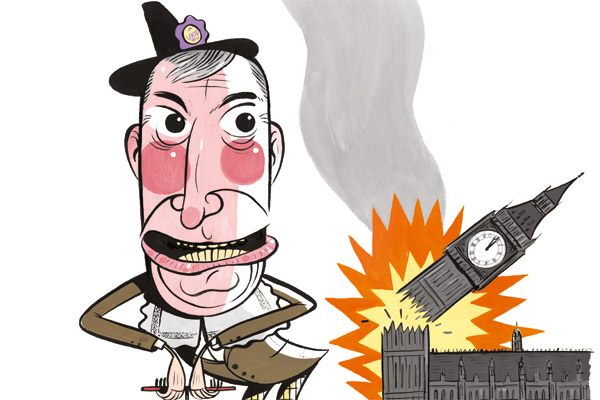Nigel Farage is in the papers again today – unbelievably! – this time with a full-page advert in the Telegraph responding to his remarks about Romanians on LBC radio.
Such was the universal media condemnation over his interview with James O’Brien that on Saturday even the Sun had an editorial on anti-Romanian racism. You couldn’t make it up.
Farage was stereotyping, and his tone of ‘you know what the difference is’ hit the wrong note, which lost him the argument over a fairly reasonable point; that is, the typical profile of a German migrant is very different to that of a Romanian migrant. For example, recent figures released showed that more than 600 Romanians and only 83 Germans were residing in UK jails, despite there being more German-born people here. On top of this a third of Romanians in Britain have been arrested, and Romanians do account for a large proportion of cash point crime in particular.
This is not to slight Romanian people. Germany is a very rich country, Romania a relatively poor one. The profile of the typical migrant from a rich to rich country is very different from one moving from a poor to rich one; the former migration attracts very highly-skilled, well-educated people, and the latter a great deal of adventurers and criminals as well as decent, hard-working people. German criminals tend to stay home, just as do British lags, except when they’ve done an armed blag and need to escape to the Costa del Sol. People in rich countries therefore have always been wary about migrants from poor countries in the way they wouldn’t from rich ones. Is that so complicated?
This comes down to the argument about whether ‘immigrants’ benefit the country. This is as meaningless as asking ‘are foreigners better at football than England?’ Put that to a football fan and he’d respond ‘which team? Brazil? San Marino? Scotland?’ If people talking about something as trivial as football ask such necessary questions, shouldn’t we be a bit more analytical about something important? Immigrants from the developed world generally benefit the economy, because the very highly-skilled disproportionately travel between rich countries (and British emigrants also benefit the countries they move to).
No immigrant group can therefore serve as a lesson about immigration generally. Mehdi Hasan was writing the other day about the founders of Tesco and Marks and Spencer and why that means we should embrace immigration today. But why? The success of Mr Cohen and Mr Marks tells us a great deal about the wisdom of letting their families come here, and it says something about the wisdom of letting in eastern European Jews in general, if Cohen and Marks were representative of a disproportionately successful group (which they were). It says literally nothing about the wisdom of allowing in, say, Somali migrants in the 1990s.
The term ‘immigrant’ is essentially meaningless in statistical terms unless we break down the figures, and this involves some degree of profiling. And although Farage was wrong to stereotype, almost everyone in practice does so in his or her private life. No one, however pure of heart, would move into an area where he was told a ‘large proportion of the population are foreign-born’ without checking out what exactly was meant by this. He might not say it, because of a mixture of social nous, politeness and hypocrisy, but his revealed preference would speak volumes (consider the obsessive degree to which many people will go to in order to get the right school for their kids).
And if he was lucky enough to be rich, then it would matter less because housing costs form as good a filter as the most stringent immigration controls on earth. So if you lived in Highgate, which is perhaps the most German area in Britain, and a Romanian moved into the £2m house next door, you could be reasonably sure that he’s not going to be the sort of person who turns up in all those lovely tabloid articles about ‘Romanians coming to steal from you’.
Such mild hypocrisy is necessary for people to rub along together, but politics sometimes involves discussing things honestly, even if it offends. Farage’s tone may have been all wrong, but the Dowager Lady moral outrage of his media critics is exactly the thing that breeds cynicism in the public.







Comments